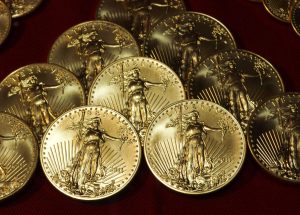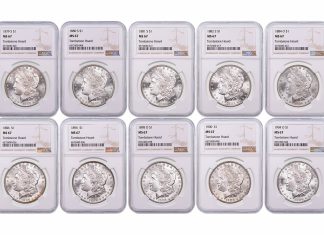Investors in the market to buy physical gold or silver should prudently take the time to shop around to avoid overpaying for purchases.
They should also be wary of potential counterfeits in the marketplace and mistaking plated "gold coins" for actual bullion products, cautions leaders of the nonprofit Professional Numismatists Guild (PNG www.PNGdealers.org) and their Accredited Precious Metals Dealers (APMD www.APMDdealers.org) division.
"Adding gold, silver, or platinum bullion coins or ingots to an investment portfolio can be a smart choice, but knowing your seller can be a crucial choice," advised PNG-APMD President Wayde Milas.
"To avoid potential scams, such as counterfeits, and to avoid paying too much when you buy or receiving too little when you sell, investors absolutely must know the credentials of the bullion dealer. If you don’t know gold, you’d better know your gold dealer," stated Milas.
Buyers should be cautious of an increase in counterfeit coins offered in the marketplace by unscrupulous sellers and beware of scam artists trying to lure investors with urgent claims of too-good-to-be-true low prices and quick, guaranteed profits.
The Anti-Counterfeiting Educational Foundation (www.ACEFonline.org) has identified hundreds of websites and social media advertisements selling counterfeit rare coins and precious metals coins and ingots. Information about the suspected spurious sellers has been given to the U.S. Treasury Office of Inspector General, but buyers should always be careful about making purchases from unknown sellers.
PNG President Milas advises investors to know that base metal replicas in the marketplace, often advertised as "tribute coins," may be merely plated or layered with just a microscopically thin coating of gold – perhaps only about $1 worth of actual precious metal.
"They may have limited secondary market value and should not be confused with genuine, legal tender gold bullion coins, such as the popular American Eagle or Canadian Maple Leaf," explains Milas.
All members of the Accredited Precious Metals Dealer program must adhere to a strict Code of Ethics (https://APMDdealers.org/apmd-code-of-ethics/) in the buying and selling of precious metals. A list of APMD member dealers is online at www.APMDddealers.org/apmd-dealers or call the Professional Numismatists Guild at 951-587-8300.







I may have purchased a counterfeit gold coin from a dealer I knew years ago. It wasn’t until I submitted the coin to be graded, that it was returned to me, ungraded, with the notice that its authenticity was dubious. Unfortunately, no explanation was given. Years later, looking at information on counterfeit gold coins, I discovered the tiny telltale marks that identify a counterfeit coin. Although I still don’t know for sure if the coin I have is authentic or not, it’s a word to the wise to be very cautious when buying coins, especially high value coins, from a… Read more »
Aside from the fact that to this day you still can’t be a hundred percent sure, Antonio, that the gold coin you purchased is in fact a counterfeit, there is is the other question as to whether it was sold to you as such intentionally or simply because this particular dealer couldn’t himself definitively differentiate between authentic and fake.
I did talk with the dealer and he told me he wasn’t aware any of the coins he sold were not authentic. Either he lied to me, didn’t know it wasn’t authentic, or the grader just didn’t want to authenticate my coin and returned it to me ungraded. I would have thought that the grading company would have offered me some explanation. It was PCGS.
From your wording it’s hard to tell, Antonio, whether or not the dealer actually admitted there was a distinct possibility that he had sold you a counterfeit gold coin, and there definitely isn’t any mention of him offering to refund your money to help ease your mind. As to what PCGS’s motivation, or lack of it for that matter, was in neglecting to provide you with an explanation as to why they didn’t grade the coin, that seems to have taken up residence in the realm of pure speculation as there appears to be no way of knowing.
Especially as the dealer has retired and I have no way to know where he’s at. As for PCGS, I know where they are. I may resubmit the coin at some point in the future.
Depending on what kind of a man he really was, he may either be clipping coupons in a modest west coast Florida retirement village or sipping twenty dollar pina coladas on the white sand beach of a five star Costa Rican luxury resort.
I think the policy is to not provide an explanation – otherwise, if you are in the business of counterfeiting, all you would have to do is keep submitting and then getting feedback from them which becomes your list of what to improve on your counterfeit until it finally passes all their tests.
Very astute observation, c_q, since one thing third party grading services should not be in the business of is providing counterfeiting advice to criminals.
But I didn’t counterfeit this coin and the other three I submitted with it were graded and slabbed.
I have no doubt about your integrity, Antonio, and it’s too bad that it had to be a gold coin of all things that may have turned out to not be the real thing.
As far as coins being slabbed to prove and protect their authenticity, that was more of a guarantee before the Chinese got into the business of counterfeiting not just coins but the sealed holders they come in.
My point is, be very cautious when purchasing gold coins from a dealer. Take due diligence and thoroughly review the coin before buying it.
Excellent advice, Antonio, which everyone in the market for gold should hearken to. Another aspect to keep in mind is to remember that if a deal looks too good to be true it most likely isn’t. Buyer beware.
That doesn’t really make any sense because there is a guide book to detect counterfeit gold coins available to the public.
It’s good to know there is such a resource out there, one which however I don’t see myself referring to as “me precious” Silver is at my price limit.
but the last thing the grading outfits need to be doing is listing what is wrong with a coin – they don’t know if the person who submitted it is just ‘testing’ them to see what criteria they look at, either in the book or not in the book, to potentially help them out.
also keep in mind that methods for detecting counterfeits are more advanced now than in the past – could be an ‘old’ successful counterfeit winds up getting caught by a newer test process.
Then again, c_q, as the testing methods for counterfeit coins become more precise, the counterfeits themselves are getting ever more sophisticated. It’s turned into one of those back and forth “contests”; every time one side ups the ante the other side goes right to work to at least even if not outright own the playing field again, all with no apparent end in sight.
The question you have to ask is, did the dealer fall for it and pass it off as real to you? The dealer I went to always tested metal and looped it. But I have also seen stories where graded coins were found to be counterfeit. So perhaps billion is the way as you get weight for almost spot, a coin for collecting will include the risk of high markup for intrinsic value. Coin and metal could be fake.